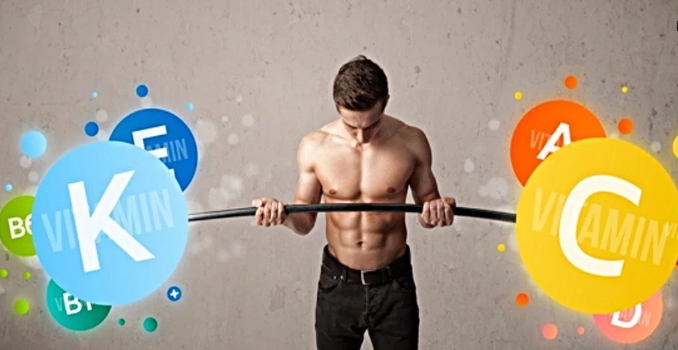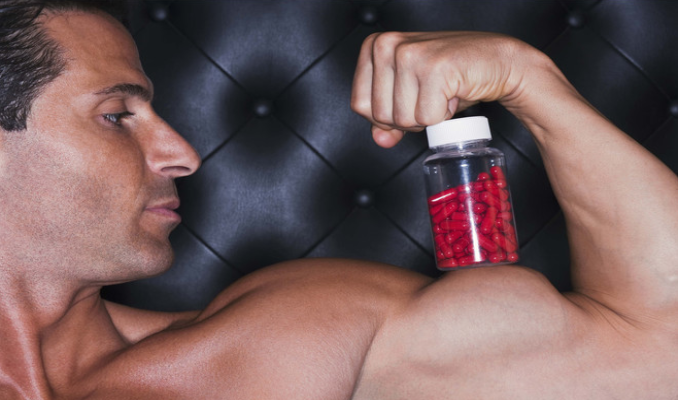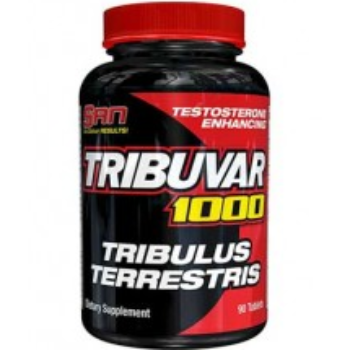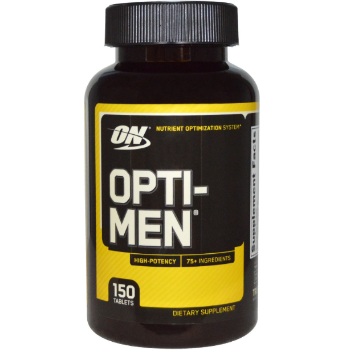For male body and the normal functioning of all organs and systems, vitamins, trace elements and minerals that every person consumes from food are important. But there are situations when the diet is not balanced enough, a man faces intense stress, undergoes stressful situations, and against the background of which the body experiences a shortage of resources and vitamin deficiency.
Neither Daily Health nor its licensors endorse drugs, diagnose patients, or recommend therapies. The absence of a warning for a given drug or drug combination should in no way be construed to indicate that the drug or combination is safe, effective, or appropriate for any given patient. Neither daily healthcare nor its licensor assumes any responsibility for any aspect of healthcare administered through the information provided.
Men involved in sports deserve special attention. It is especially important for them to monitor their diet and health, replenishing the body’s waste after intense training. You can increase endurance and strength, vitality and performance with the help of a complex of vitamins. In addition, sports nutrition also helps to replenish the body's losses during training.
The information contained here is not intended to cover everyone possible applications, directions, precautions, warnings, interactions with medicines, allergic reactions or side effects. If you have any questions about the medicines you are taking, ask your doctor, nurse or pharmacist.
We recommend that you do not rely solely on the information provided and always read labels, warnings and directions before using or consuming a product. The human body needs 13 vitamins, ranging from vitamin A and zinc! But which ones are essential when you lead an active lifestyle?
What vitamins does an athlete’s body need?

Since numerous vitamin complexes are offered to men in a huge assortment, choosing one or another drug right away is not so easy. First, it’s worth figuring out exactly what vitamins are necessary for men involved in sports.
Most people happily take a multivitamin and mineral supplement every day for years, but few stop to think about which vitamins the human body needs. Almost 99% human body consists of oxygen, hydrogen, carbon, nitrogen, calcium and phosphorus. All 11 of them are considered essential for life. And the human body contains 13 vitamins, four of which are fat-soluble and nine are water-soluble.
As expected, water soluble vitamins dissolve in water, and we lose a lot of them when we urinate. excreted from the body to such an extent that urine output is a strong predictor of vitamin intake. So, not only are these vitamins and minerals critical to our body, but they can also become depleted. We must carefully monitor our vitamin and mineral intake to ensure our bodies get what they need and can build, grow, perform and repair without failure.
Namely:
- Vitamin A- a source of necessary substances for the organs of vision and protein synthesis, which is very important for men seeking to increase muscle mass. Retinol is essential for the normal functioning of joints, cartilage, tissue and bones. It is also an excellent antioxidant that cleanses the body of free radicals and other toxins. You can get it from dairy products, carrots, fatty fish and liver.
- B vitamins- substances that ensure the normal functioning of several systems and organs at once. Some of them are aimed at converting fats, carbohydrates and proteins into useful energy, others promote protein synthesis. Other vitamins from this group help metabolic processes, hemoglobin production, and normal operation nervous system. You can find such vitamins in eggs, buckwheat and oatmeal, wholemeal bread, meat and dairy products, leafy vegetables, yeast, and peas.
- Vitamin C- helps to process proteins, and thanks to its anti-catabolic properties, the vitamin protects proteins from destruction. In addition, the vitamin acts as an antioxidant, that is, a cleanser of the body from harmful substances. The most vitamin C is found in kiwi, currants, rose hips, rowan, and parsley.
- Vitamin D- this vitamin is produced in the skin under the influence of sun rays, it is aimed primarily at protecting the bones of men involved in sports. This vitamin also helps strengthen muscles and accelerate brain activity. You can find the vitamin in some types of fish, liver, vegetables and fish oil.
- Vitamin E- the best antioxidant that helps athletes build muscle mass by helping in protein synthesis. The vitamin also helps nervous system and the brain in its functions, increasing stress resistance. Without vitamin E, the sex glands, which are responsible for testosterone levels, cannot function. It is this hormone that controls muscle growth. You can find this vitamin in oils, parsley, spinach and tomatoes.
For reference! Regardless of how important vitamins are for an athlete’s body, an overdose can lead to Negative consequences. Therefore, most vitamins require an exact daily dosage that meets the needs of the human body during physical activity.
When you're athletic and active, some of these vitamins and minerals become even more important. One of them is calcium. Your body releases calcium when you sweat heavily through exercise and if you build muscle tissue, you may need more than this to get started. It can be difficult to get enough calcium from food, so consider taking a daily supplement.
Iron is another important mineral for athletes as it helps transport oxygen around the body. Adult women may often experience insufficiency due to menstrual cycle, and vegetarians may be deficient in iron if their diet is low. Exercise can help low level iron in the body, especially if your sessions are long.
Microelements and amino acids
In addition to vitamins, for the normal functioning of the athlete’s body and successful training, it is necessary to replenish microelements. They are not sources of energy, but are involved in metabolic processes, enzymatic reactions and are excellent antioxidants. 
Magnesium is part of 300 enzymes in the body and an important part energy metabolism and density bone tissue. The trouble is, we lose magnesium quickly through sweat, so make sure your diet and routine help you replenish. Another mineral lost during sweat is potassium. It is a key electrolyte that helps regulate the amount of fluid your body reduces blood pressure and supports muscles and nerves. The good news is that it is relatively easy to balance potassium levels with sports drinks or regular sports diet foods such as bananas.
Microelements for athletes:
- Iron- an important substance for the production of hemoglobin and the transport of oxygen within the body. Without it, energy production and a decent level of endurance are impossible. In addition, a lack of iron can lead to anemia, which has serious consequences for the athlete.
- - involved in protein formation and muscle building. First, zinc controls carbohydrate metabolism, secondly, it is necessary for the production of insulin and testosterone. Zinc is needed for immune system, helping to increase the body's endurance and resistance to negative factors.
- Magnesium— for carbohydrate-protein metabolism, magnesium is a kind of spark plug, without it it is impossible to build muscles, it promotes blood circulation, improves tissue elasticity and increases the body's resistance. But magnesium is most important for the nervous system.
- Calcium- an important trace element for bone strength, preventing osteoporosis, muscle weakness, and insufficient contractility.
- Selenium- an antioxidant that also simulates immunity, reduces the activity of heavy metals, cleansing the body of them. This substance provides a person good mood, promoting the production of appropriate hormones.
- Chromium- an indispensable component for the breakdown and restructuring of carbohydrates, promoting the burning of adipose tissue. During intense physical activity, chromium helps reduce glycogen levels.
- Potassium- controls the level of water and glycogen in the body, and most importantly, increases muscle contractility. Potassium helps lower blood pressure and relax the body after exercise.
For reference! Potassium is a component of almost all vegetables and fruits, so it is the only micronutrient that does not lead to deficiency.
Monitor your potassium and other electrolytes if you are an endurance athlete or do long training sessions in warm weather. They help convert protein and sugar into energy, help your body produce red blood cells, and are part of the process of building and repairing muscle. Vitamin C is probably one of the most famous vitamins in supplement form, but do we really know what it does for our bodies? This is important for a healthy immune system, especially when your body is under stress.
It even helps mitochondria in muscles recover energy during muscle contractions. But our bodies can only benefit from decent sunlight. So get it sunlight on your skin every day if you can. Vitamin E is an antioxidant that can support your immune system to reduce your chances of coming down with annoying coughs and colds throughout the year. If you eat a low-fat diet, you risk being low on this oil antioxidant.
As for amino acids, they are necessary for the formation of protein, building muscle mass, increasing mental abilities, improving psycho-emotional background, and sexual activity. For muscle growth, amino acids such as leucine and isoleucine, valine and taurine, glutamine and histidine, and arginine are needed. The amino acids carnitine, phenylalanine and lysine can be useful for burning fat tissue and losing weight.
Supplementing is a smart way to take controlled doses every day. We don't need a lot of zinc, but it is important for a wide range of things in the body, including the function of a healthy immune system. Zinc is part of over 300 enzyme processes in the body. Having enough zinc in your daily diet supports oxygen absorption, meaning you can work harder for longer. If you eat plenty of animal protein, you are unlikely to be deficient in zinc.
Most of these important vitamins and minerals can be found in food, but getting the right amounts is a delicate balancing act. We developed it specifically for sports, active people who need wide range vitamins, minerals, probiotics and antioxidants to support regular training and healthy body. Nicola Joyce writes about sport, fitness, nutrition and healthy living. When she's not writing content, she can be found blogging.
TOP sports nutrition manufacturers
Global manufacturers regularly release new products in the field of sports nutrition, which greatly complicates the choice due to ignorance of which is better to choose in a particular case. But the primary selection factor is the rating of the manufacturer itself.
Top 5 the best manufacturers sports nutrition: 
This research review looks at new news about micronutrients and how to apply the findings to high-performing clients. Rarely does a day go by without a new nutrition study making news. Science of nutrients- especially specific vitamins and minerals - is dynamic, with new results emerging regularly.
Between claims from supplement makers and "news about news" about small, sometimes suspicious studies, the public may be apologetic for being a little confused. As fitness professionals, you have clients who come to you for reliable health information. And while it's always advisable to refer clients to a registered dietitian for more in-depth nutrition counseling, fitness professionals can help filter fact from fiction when it comes to vitamins, minerals and performance.

It is also worth noting the special sports nutrition from TWINLAB, which is suitable for allergy sufferers and novice athletes due to its gentle composition. Otherwise, it is difficult to say unambiguously which global sports nutrition manufacturer is the leader, since they all have their own characteristics and weaknesses.
While nutrition experts agree that food is the preferred source of vitamins and minerals, there are times when supplements may be necessary. Read evidence-based information about key vitamins and minerals that play an important role in sports nutrition, so you can be confident that the information you share with clients is accurate, timely, and within the scope of your practice.
The greatest hits of vitamins and minerals. Good methods nutrition helps balance the added metabolic stress that exercise creates. In addition to macronutrients, the body needs micronutrients such as vitamins and minerals to meet its increased needs and to improve overall health. good health. In sports nutrition, micronutrients play an important role in energy production; oxygen transportation; bone health; maintaining a healthy immune system; and protection against free radicals that cause oxidative damage.
The most necessary sports vitamins: list


To select the appropriate vitamin complex according to the body's needs and individual characteristics, you can consult a medical specialist.
Vitamins and minerals also help build and repair muscle after exercise or injury. The list of vitamins and minerals that an athlete's diet requires and may also lack include B vitamins; Vitamin D; vitamins C and E; beta-carotene and selenium; and calcium, iron, zinc and magnesium. It is also important to get enough sodium and potassium in the right amounts, which may vary from person to person. Sidebar " brief information: Current Human Recommended Allowances and Upper Limits for Vitamins and Minerals Associated with Athletic Performance.”
Hello! Let's talk about what vitamins every person involved in sports, and, in general, every person should take.
A little history
Even in ancient Egypt, it was known that in order to avoid night blindness, it is necessary to eat liver (night blindness can be caused by a lack of vitamin A), and about 700 years ago, humanity knew that for health it is necessary to combine a variety of foods.
High intensity performance can suffer when vitamin B levels are low, and exercise can double the body's need for riboflavin and B6 in particular. High-intensity activity may also increase homocysteine levels, an amino acid biomarker for heart disease, which can be lowered by getting enough folic acid and vitamins B 6 and B 12.
Clinical deficiency of B vitamins, which help in the production of red blood cells, can lead to anemia. The resulting weakened ability to transport oxygen throughout the body most affects endurance athletes. Since it can take about 3 months before the first signs of anemia are detected, encouraging athletes to obtain adequate intake levels earlier rather than later in the training process is a good idea. Dietary sources for B vitamins include whole grains, leafy greens, beans and peas, fish, lean poultry and meat, eggs and low-fat or low-fat dairy products.
In the 18th century and earlier, there was a very serious and deadly problem, especially among sailors, scurvy!
When this disease appears, gums begin to bleed, teeth fall out, blood vessels become brittle, limbs become very painful, and immunity declines. Anemia then develops.
Especially on long-distance ships, all this led to inevitable death.
This vitamin has come a long way from being a calcium booster. However, its role in promoting bone health remains a key factor for optimal human health and athletic performance and is one of the main reasons athletes get enough of this important nutrient.
Now, recent research points to a host of benefits, from heart health to risk reduction certain types cancer. In terms of protection against cancer, the beneficial mechanism appears to be the vitamin's ability to support cell function. in a healthy way, promoting cell renewal, as well as preventing unwanted reproduction.
All this happened until the Scottish scientist James Lind in 1747 proposed adding sour foods (initially lemons and limes) to the diet of sick sailors. It turned out that they can cure scurvy (scurvy is caused by a lack of vitamin C).
He did not immediately receive recognition, despite the “Treatise on Scurvy” he wrote, but already in 1795, sauerkraut, malt wort and citrus syrup were added to the diet of ALL SAILORS.
As a result, NOT ONE more sailor died from scurvy.
Interesting: After this, the sailors began to be called “lemons”, and on this basis numerous so-called sailors were established. “lemon riots”, in which sailors threw barrels of citrus syrup and lemon juice from ships.
Despite the fact that in 1929 scientists Hopkins and Aickman received Nobel Prize for the discovery of vitamins, the origins of this discovery began 50 years earlier in the research of the Russian scientist Nikolai Ivanovich Lunin.
He fed experimental mice all the known elements that make up cow's milk: sugar, proteins, fats, carbohydrates, salts. All the mice died after that.
In September 1880, Lunin concluded that to preserve the life of an animal, in addition to proteins, carbohydrates, fats, salts and water, other substances unknown at that time were needed.
Vitamins
Vitamins(from Latin vita - “life”) - a group of low molecular weight organic compounds relatively simple structure and diverse chemical nature.
They are also called “micronutrients”, due to the fact that the body needs them in extremely small quantities compared to (proteins, fats, carbohydrates).
These are irreplaceable elements of dietary (and regular) nutrition, most of which the body is not able to synthesize on its own.
Multivitamins – pharmacological preparations containing a complex of vitamins and minerals.
By the way, what is the only natural multivitamin that exists in nature? BREAST MILK! It contains a huge valuable set of many essential vitamins.
There are 2 types of vitamins:
- Water soluble (B vitamins, vitamin C).
- Fat-soluble (Vitamins A, D, E, K).
Fat-soluble vitamins can accumulate in the body, so taking them in excess can be toxic.
Water-soluble vitamins are not as dangerous if consumed in excess, because... their excess can be excreted in the urine, with rare exceptions.
In the human body, vitamins work, as a rule, as “coenzymes”, i.e. increase the activity of enzymes that are involved in many chemical processes in our body, including protein synthesis (the main process necessary for muscle growth).
In general, you will not be able to build muscles if you do not take the required amount of vitamins, because... your body will not be able to convert the substances entering it (many enzymes cease to function) into the elements from which muscles are built.
That is why many novice athletes, even with proper training and nutrition, sometimes cannot gain impressive muscle mass, because... There are not enough vitamins in the diet (many enzymes are turned off and cannot direct the incoming substances in the right direction).
Vitamins, despite their diversity of chemical structure, can be called organic substances, small quantities of which must come from outside, because in the human body they are either not synthesized at all, or are synthesized insufficiently (as, for example, the formation nicotinic acid from tryptophan).
An exception is vitamin D, which is synthesized in the body under the influence of ultraviolet radiation.
What vitamins should be in a bodybuilder's diet?
All. But the key role in bodybuilding is played by those vitamins, which I will tell you about later.
It has long been proven that the need for vitamins in athletes increases greatly due to the accelerated course of metabolic processes!
During training, the need for vitamins can increase by 1.5-2 times.
The problem is that athletes simply cannot add more fruits and other sources of vitamins to their diet, because... this will lead to digestive upset, so every bodybuilder should provide himself with vitamins by resorting to the use of special sports vitamins.
So, here are the vitamins that should be in your diet:
VITAMIN C (ascorbic acid). The KING among vitamins for every person, not only for the athlete. It promotes PROTEIN SYNTHESIS, improves immunity, promotes collagen formation, participates in redox processes, affects the nervous and endocrine system. Another very important detail in that it participates in the synthesis process steroid hormones, and testosterone, including.
Daily requirement for ascorbic acid ordinary person: 70 mg.
Daily requirement of an athlete:
- During training: 150-200 mg;
- During the competition and 2-3 days after them, 200-300 mg;
Contained in rose hips, cauliflower, spinach, sorrel, lemon, green onions, tangerines, etc.
VITAMIN B1 (thiamine). B1 PUMPS MUSCLES, because... this vitamin plays a very important role in protein, fat and mineral metabolism. It is directly involved in protein synthesis. With its deficiency, carbohydrates are burned, which leads to the accumulation of pyruvic and lactic acids in the body. Thiamine STIMULATES PERFORMANCE, which allows you to endure increased physical and mental stress with its help.
Daily dose of vitamin B1 for athletes: 0.7 mg per 1000 kcal of diet.
Contained mainly in plant products(hulls of cereal grains, wholemeal bread, peanuts, beans, oatmeal, pork and beef kidneys, walnuts, brewer's yeast, etc.
VITAMIN B6 (pyridoxine). Plays a very important role in the processes of intermediate amino acid metabolism (participates in protein synthesis), participates in the breakdown of glycogen, the formation of hemoglobin (the main transport of oxygen in the blood). It is also involved in the utilization of protein in the body, so the more protein you eat, the more vitamin B6 you need.
Daily requirement for vitamin B6: 5-10 mg. As protein increases, the need for this vitamin increases.
Found in dry yeast, meat, fish, eggs, legumes, bananas, potatoes, milk and bread.
VITAMIN B5 (pantothenic acid). Participates in the implementation of such biochemical processes as: oxidation and biosynthesis of fatty acids, synthesis citric acid, as well as BIOSYNTHESIS OF STEROIDS!!! Fortunately, you can get it from almost any product of plant and animal origin.
Daily dose of vitamin B5: 15-20 mg.
Contained in kidneys, egg yolk, meat, potatoes, tomatoes, cabbage, buckwheat, oats.
VITAMIN H (biotin). Plays a very important role in the metabolism of amino acids and obtaining energy from various sources. This vitamin is essential for balancing your diet. Participates in the synthesis of protein and fatty acids.
Daily requirement: 0.3-0.4 mg.
Contained in green peas, egg yolk, beans, cabbage, potatoes, and ground nuts.
VITAMINS GROUP D (ergocalciferol, cholecalciferol). The most important function is that they promote the absorption of calcium and phosphorus, without which strong bones not to be seen. Vitamin D can be synthesized in the body when exposed to sunlight.

Due to the fact that in the regions of the far north a big problem with the sun (I say this as a resident of Karelia), then athletes need to consume this vitamin additionally 400-1000 IU per day.
Contained in Baltic herring liver fat, chicken eggs, milk, and butter.
VITAMIN B3. Participates in the processes that control the flow of energy and is very important for ensuring muscle nutrition during training.
Contained, for example, in turkey meat.
VITAMIN E (tocopherols). Antioxidant that protects against damage cell membranes. Vitamin E reduces the amount of free radicals in the body (one of the causes of aging). Free radicals are by-products cellular respiration, and their accumulation leads to degeneration and damage to cellular structures.
Daily requirement: 40 mg.
Contained in sunflower oil, legumes, wheat flour, oatmeal, liver, egg yolk.
VITAMIN A (retinol, retinoic acid). Firstly, it is involved in protein synthesis and the growth of bones and skeleton. Secondly, it participates in the processes of glycogen accumulation (the main “fuel tanks” in the muscles and liver). Thirdly, it is directly involved in the processes of photoreception (providing twilight, light and color vision).
Daily requirement for vitamin A: 2.5-4.0 mg.
VITAMIN B2 (ribolavin). Participates in the processes of biological oxidation of fatty acids and energy formation, hematopoiesis, glucose metabolism and hydrogen uptake. Ribolavin regulates PROTEIN METABOLISM!
Daily requirement: 0.8 mg per 1000 kcal.
Found in meat, fish, eggs, liver, oatmeal, milk and dairy products.
VITAMIN B12 (cyanocobalamin). It is necessary for the synthesis and breakdown of a number of amino acids. Regulates carbohydrate metabolism and ensures vital functions nerve fibers. Stimulates muscles through nerves!!! And this is a key factor in the success of any movement.
Daily dose: 0.004-0.01 mg.
Contained in beef and cod liver, beef, pork, cod.
All other vitamins must also be obtained from food, but I have listed those without which any sport is simply impossible!!!
Should I take a break from taking vitamins?
In the treatment of chronic inflammatory diseases and decreased immunity, for example, SUPER HIGH DOSES of vitamin C (10-15 g/day) can be prescribed. Only such dosages should not be used for longer than a month, because... the body adapts to high doses ascorbic acid and just remove it with urine!
Need to remember: ANY VITAMIN SHOWS MAXIMUM ACTIVITY WITHIN A MONTH, then the body adapts and efficiency decreases sharply!
After a month of taking multivitamins, you should take a break, then resume taking them.
You can alternate, for example, a monthly course of vitamins E, C, B12, B5, and then repeat, so you spend less money and get the maximum benefit.
But it will be better to simultaneously use vitamins that give a synergistic effect, i.e. which reinforce each other, for example:
- B1, B2, B6 and C;
- S and R;
- B1, B2 and RR;
- B12, B6 and C;
Also, special sport complexes, which contain a number of vitamins and minerals.
Moreover, high-quality sports vitamins, as a rule, use technologies that allow synergistic vitamins to be released simultaneously, while retaining others that reduce the effectiveness of the first. Those. alternate release. It is very comfortable. I drank 1-2 capsules and forgot.
On this moment Ksyusha and I take these vitamins.


